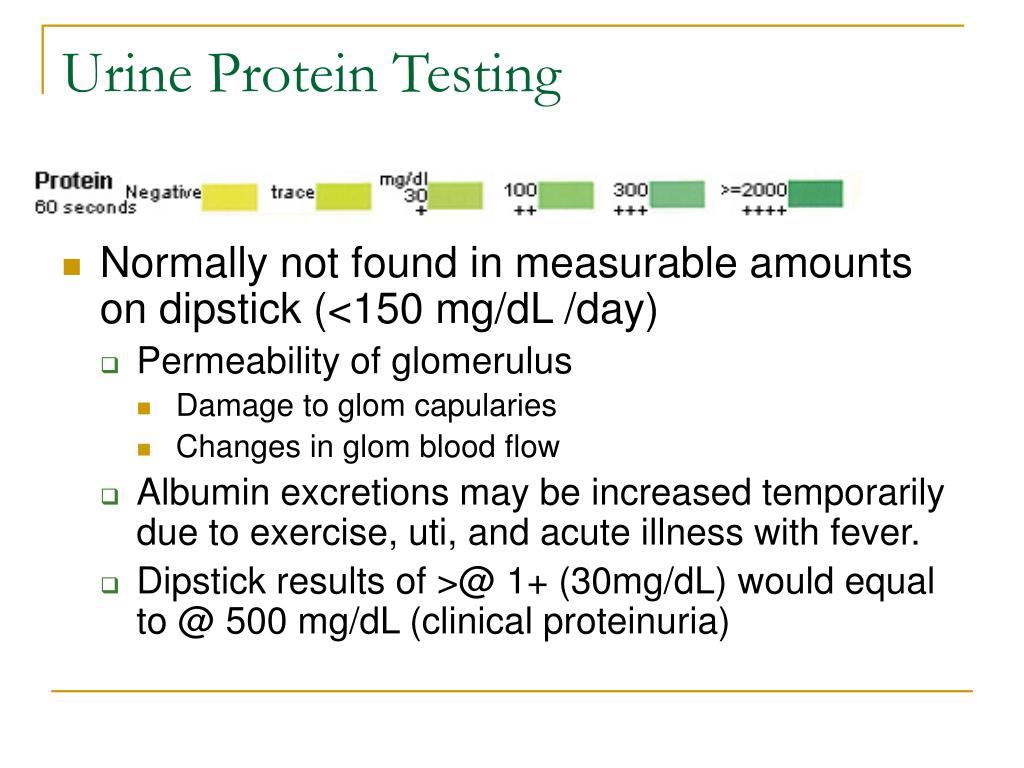30 mg dl protein in urine during pregnancy S ameer 2015 dysuria
Urine Strip Protein Test: A Vital Diagnostic Tool
 When it comes to diagnosing various health conditions, medical professionals rely on a wide array of diagnostic tools and tests. One such important instrument is the urine strip protein test. This test plays a significant role in assessing the amount of protein present in a person’s urine and can provide valuable insights into their overall health.
When it comes to diagnosing various health conditions, medical professionals rely on a wide array of diagnostic tools and tests. One such important instrument is the urine strip protein test. This test plays a significant role in assessing the amount of protein present in a person’s urine and can provide valuable insights into their overall health.
The image above showcases a urine strip protein test in action. The test strip, which is dipped into a urine sample, contains chemicals that react with protein molecules. By visually examining the color change on the test strip, healthcare providers can determine the protein levels and make informed medical decisions based on the results.
Importance of Assessing Protein Levels in Urine
Proteins are essential components of our bodies and perform various functions. However, their presence in urine can indicate potential health issues. High levels of protein in urine, known as proteinuria, can be a sign of kidney damage or dysfunction.
The second image showcases the importance of renal pharmacotherapy, which focuses on treating conditions related to the kidneys. This field of medicine plays a crucial role in managing kidney diseases and complications associated with them.
 Treating Kidney Conditions
Treating Kidney Conditions
Renal pharmacotherapy plays a vital role in the treatment of kidney-related conditions. The kidneys are responsible for filtering waste products from the blood, regulating fluid balance, and maintaining proper electrolyte levels. However, factors such as high blood pressure, diabetes, and certain medications can lead to kidney damage.
Implementing pharmacotherapy in kidney treatment involves the use of medications that can help control blood pressure, reduce protein loss in urine, and slow down the progression of renal diseases. These medications may include angiotensin-converting enzyme inhibitors (ACE inhibitors), angiotensin receptor blockers (ARBs), diuretics, and immunosuppressants.
The Role of Proteinuria Testing
Proteinuria testing, such as the urine strip protein test, is crucial in monitoring the effectiveness of renal pharmacotherapy. By assessing protein levels in the urine, healthcare providers can evaluate the response to treatment and make necessary adjustments to medication dosage or type.
Regular proteinuria testing is particularly important for individuals with known kidney conditions, such as chronic kidney disease or diabetic nephropathy. It helps detect worsening kidney function, identify potential complications, and guide the treatment plan.
Conclusion
The urine strip protein test is a valuable diagnostic tool used by medical professionals to assess protein levels in urine. Through this test, healthcare providers can detect proteinuria and monitor the progress of kidney-related conditions. Renal pharmacotherapy, depicted in the second image, plays a crucial role in managing kidney diseases and ensuring optimal kidney function. By adhering to regular proteinuria testing and implementing appropriate treatments, individuals can proactively maintain their kidney health and overall well-being.
If you are searching about Moms Hub: 30 mg protein in urine with uti you’ve visit to the right place. We have 5 Pics about Moms Hub: 30 mg protein in urine with uti like Moms Hub: 30 mg protein in urine with uti, S ameer 2015 dysuria and also 蛋白尿新觀念. Here it is:
Moms Hub: 30 Mg Protein In Urine With Uti
 moms-hub.blogspot.comurine uti urinalysis agreed collected randomly
moms-hub.blogspot.comurine uti urinalysis agreed collected randomly
蛋白尿新觀念
 www.accuspeedy.com.twS Ameer 2015 Dysuria
www.accuspeedy.com.twS Ameer 2015 Dysuria
 www.slideshare.netdysuria ameer
www.slideshare.netdysuria ameer
The Amount Of Protein In The Urine Is Assessed As 1+ (30 Mg Per DL), 2
 www.pinterest.comprotein urine mg dl
www.pinterest.comprotein urine mg dl
Renal Pharmacotherapy 2
 www.slideshare.netpharmacotherapy renal proteinuria urine albuminuria
www.slideshare.netpharmacotherapy renal proteinuria urine albuminuria
Protein urine mg dl. The amount of protein in the urine is assessed as 1+ (30 mg per dl), 2. Urine uti urinalysis agreed collected randomly